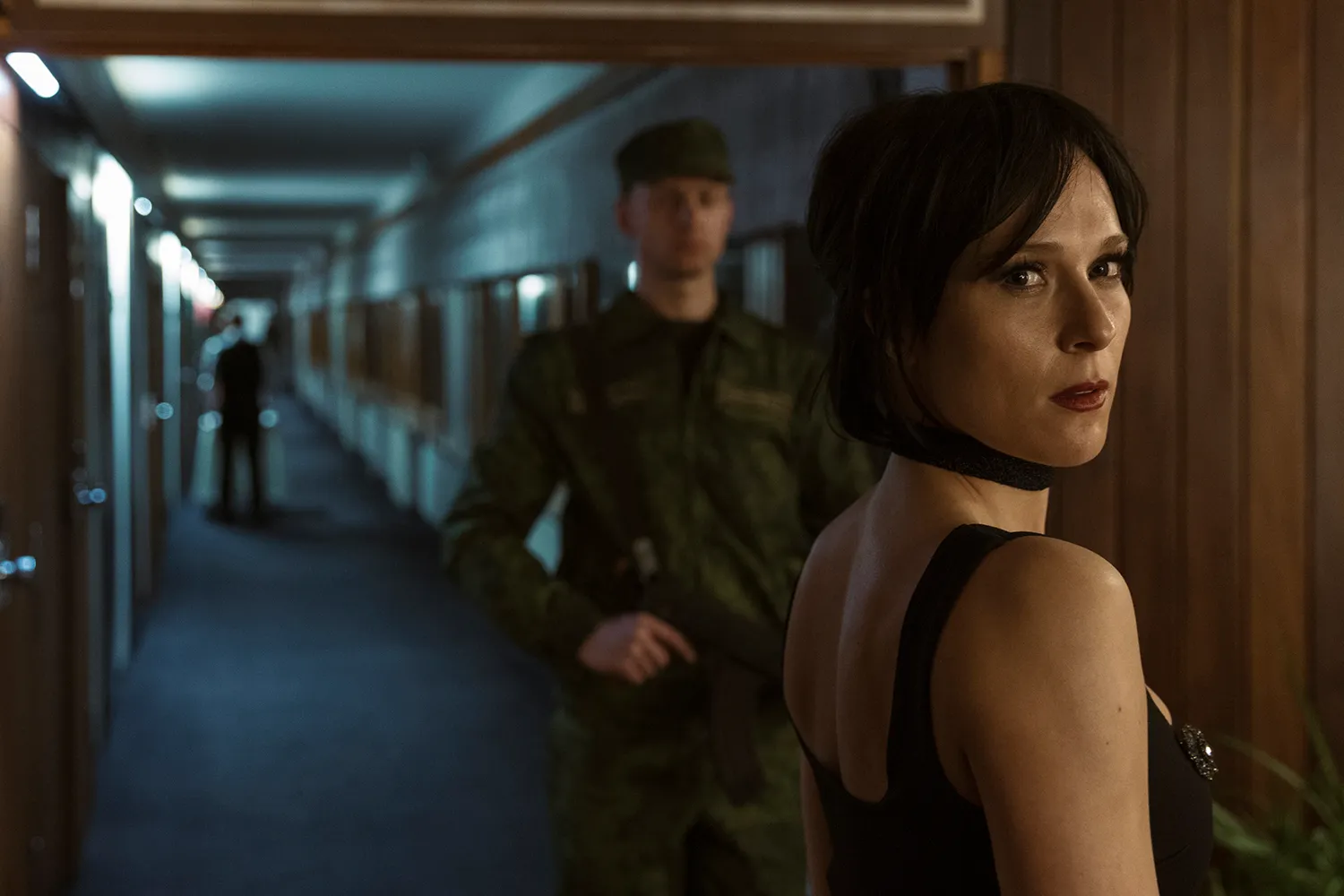A Polish Jason Bourne

Review
A Polish Jason Bourne
Seven years after Russia’s annexation of Crimea, the Suwalki Gap gets its own thrilling spy show.
Lena Gora in a scene from The Eastern Gate. Max
Readers of Foreign Policy are, by and large, the type of people who work hard to understand difficult topics and are rewarded for their intellectual rigor with a firm and fundamental comprehension of complex situations. (This is a compliment.) And that’s precisely why I’m recommending the splendid new spy series The Eastern Gate, currently streaming on Max, to you.
The new show, produced by the Warner Bros. Discovery-owned Polish broadcaster TVN, is six episodes long, and I am not ashamed to admit that for five-and-a-half of those episodes my primary reaction was, “Wait, what the hell is going on?” But by the end, every puzzle piece snapped together perfectly. Perhaps more importantly, the steps along the way, which may have kept me guessing, also held me in their grip.
Readers of Foreign Policy are, by and large, the type of people who work hard to understand difficult topics and are rewarded for their intellectual rigor with a firm and fundamental comprehension of complex situations. (This is a compliment.) And that’s precisely why I’m recommending the splendid new spy series The Eastern Gate, currently streaming on Max, to you.
The new show, produced by the Warner Bros. Discovery-owned Polish broadcaster TVN, is six episodes long, and I am not ashamed to admit that for five-and-a-half of those episodes my primary reaction was, “Wait, what the hell is going on?” But by the end, every puzzle piece snapped together perfectly. Perhaps more importantly, the steps along the way, which may have kept me guessing, also held me in their grip.
A scene from The Eastern Gate.Max
The Eastern Gate is set in early 2021, seven years after Russia’s annexation of Crimea and with, as the opening titles put it, “the threat of war real again.” The Polish government is worried specifically about the Suwalki Gap, a strip of land on its northeastern border with Lithuania. Belarus is to the east of this small passage, and Russia—in the form of the isolated Kaliningrad Oblast—is to its west. This setting is, undoubtedly, an unusual spot on the political map, and prompted me to hit pause and poke around on Google Earth on several occasions.
During the Cold War, the Suwalki Gap wasn’t exactly a center of thrilling geopolitical action. But with Poland and Lithuania now a part of NATO, and Russia (with its fellow traveler Belarus) increasingly bellicose, to put it mildly, one can easily see how it could become a choke point, and critical to world security. As most watch and fret over news developments in the region and hope for cooler heads, show director Jan P. Matuszynski has led a creative team to imagine all the deadly and dazzling maneuvers that could very well be happening in the area.
The Eastern Gate’s realism and high stakes are much of what makes it so gripping, but its creators also know how to put on a good show. In the very first episode we enter a palatial Kaliningrad estate on the night of a grand ball, its halls choked with blustering bald generals and slinky women in sparkly dresses. Catching our eye is a blonde in red, who we soon learn is Ewa (Lena Gora), a Polish undercover agent posing as the Latvian date of a dopey playboy whose mother is a celebrated Russian nuclear physicist. She’s there to swap a pair of mom’s enormous glasses with an identical but bugged pair. She comes close to achieving this with no hiccups—but if she did, we wouldn’t get a chance to witness her inordinate fighting skills, or watch her refuse to blow her cover by calling in the cavalry, even when the odchody has hit the fan.
The Kaliningrad operation is a pyrrhic victory, giving Ewa, her wig now removed, time for a temporary respite with her sister and nephew somewhere in the countryside, while others in the agency look toward their next adventure. Following the suicide of a consul, it is believed that there is a mole in the Polish embassy in Minsk feeding information to the Russians. Ewa’s partner (and lover) Skiner (Karol Pochec) heads to the not particularly glamorous city, posing as a businessman, but he soon falls into the clutches of Belarussian agents. (If you can make it past this early interrogation scene, you can handle the rest of the violence in this series.) Ewa, called up from her time off, crosses the border, pretending to be the consul’s replacement. All she knows is that anyone she meets could be the one selling her country out.
While Ewa gets the lay of the land, we meet an array of colorful characters, including a tough-as-nails head of security with jet black hair and steely eyes (Ewelina Starejki) and a bearded, potbellied cultural attaché pursuing “the rights of the Polish minorities in the East” (Leszek Lichota). There are a slew of side stories, including the Kaliningrad scientist (Alona Szostak) who, while grieving the loss of her son after his run-in with Ewa, begins to suspect foul play, and starts doing some sleuthing during her hours off from working on what appears to be a very deadly and secretive assignment. A Belarussian-Polish prisoner exchange takes a strange turn when a Polish patriot decides to stay in Minsk. And Ewa’s nephew Kai moves toward political activism, working to help migrants caught up in the no man’s land of the Polish-Belarussian border. (For something with far less showbiz razzle dazzle on that absolutely devastating topic, see Agnieszka Holland’s recent film Green Border.)
These side plots churn along through the lens of whatever the Polish version of weltschmerz, or all-encompassing melancholy, is. The videos edited by idealistic Kai show how Poland’s increasing reluctance to maintain open borders is harming desperate people caught up in the currents of history. But an offhand comment from one of the good guys at Warsaw HQ throws some red meat to any xenophobes who may be watching, suggesting that, yes, of course, there are Russians and terrorists and plenty of “bad actors” using the surge of refugees as cover to sneak into the country.
Our primary focus is on Ewa, however, slinking around Minsk trying to sniff out the mole. She’s supposed to stay put at the consulate and her small apartment, which looks more like a drab dormitory. (The Minsk tourism board won’t be the biggest fan of this show.) Of course, all it takes is a tweak to her hairstyle and a new outfit, and Ewa can fit in anywhere. Things heat up after a peculiar terrorist bombing, which at first looks like the work of Polish nationalist zealots, but Ewa pieces together is actually a sneaky Belarussian (and therefore Russian) false flag operation.
This is just the beginning of a series of crosses, double-crosses, and generally sneaky, unpredictable behavior. Some of the tropes are classic, like spooks passing information to their assets inside an old church, but some are more modern, like the use of Twitter with its zany avatars to signal assets in the field. (What did Cookie Monster ever do to get involved in all this?)
Gora in a scene from The Eastern Gate.Max
What works best in The Eastern Gate, though, is its specificity. When danger comes to the Polish consulate, it’s fascinating to watch its employees’ best practices for security go into effect. While there is plenty of spy craft in the show, and Ewa could certainly hold her own against Jason Bourne, Poland does not have an infinite budget, and working at the Minsk office is far from a luxury assignment. (They can’t even get good mineral water, leading one diplomat to import his own and causing his colleagues to mock him a bit.) When the time comes to circle the wagons, everybody is sleeping on cots.
Other points of fascination stem simply from the geography. Kaliningrad is an important element to the story, and there are some good establishing shots of the Russian oblast. Ever since I was a dorky kid who liked to stare at maps, I’ve had a fondness for corners of the political world that seem to be doing their own thing. (Where is the series about Eswatini—formerly Swaziland—and Lesotho, the islands of land within South Africa?)
The Baltic stronghold of Kaliningrad was first established in 1255 as a fortress built by Teutonic Knights, and was known as Königsberg when it became part of the Prussian Empire in the 16th century. German was its official language but it had significant Polish and Lithuanian minorities. It remained German until the end of World War II, when it was annexed by the Soviet Union. It was the birthplace of E.T.A. Hoffman, Immanuel Kant, and Christian Goldbach. The University of Königsberg, dating back to 1544, was an important center for the development of mathematics, and the region is the source of Königsberger Klopse, a German meatball dish served in a white sauce with capers. Because Königsberg translates to “king’s mountain,” at least one food blogger with an ear for classical music and ribald humor calls this dish “the balls of the mountain king.”
It’s a spot with some history, and deserving of its TV close up, and when you sit down to watch something like The Eastern Gate, you realize how many plot-driven thrillers default to London or Washington, D.C. It’s nice to get a new setting for a change.
For viewers in the United States, however, you need to take an extra step when watching the series on Max. The streamer defaults to a dubbed version; Russian is subtitled, but the original Polish lines are in English. It took me a few minutes to realize this before I went into the settings to revert to the original languages. Though dubbing techniques have certainly advanced since I first watched Bruce Lee movies on VHS, voice-over will always come off as more awkward than watching actors speaking their native tongue.
As I mentioned up top, The Eastern Gate has a very satisfying ending, but also one that leads you to say, “Oh, I see where this could go if they want to continue.” Luckily that second season has already been ordered. I will not tell you which of the actors are not listed to return, as this would suggest which of the side characters are no longer breathing after the first season’s wild conclusion. I will say, though, that with Lena Gora’s Ewa defending against enemies foreign and domestic, I feel secure in Poland’s future.
Jordan Hoffman is a film critic and entertainment journalist living in Queens, New York. X: @jhoffman
More from Foreign Policy
-

An illustration shows a line of large shopping carts facing down a small Donald Trump figure holding two shopping bags. The stars of China’s flag are in the upper left corner. Why Beijing Thinks It Can Beat Trump
China’s elites have a new confidence in their own system.
-

U.S. Army Chief of Staff Randy George speaks to U.S. soldiers at the Hohenfels Training Area in southern Germany on Feb. 6. A Drawdown of U.S. Forces in Europe Is All but Certain
Here’s how the Pentagon can rebalance its approach to the continent without sacrificing U.S. interests.
-

University of California, Los Angeles students, researchers, and demonstrators rally during a “Kill the Cuts” protest against the Trump administration’s funding cuts on research, health, and higher education in Los Angeles on April 8. Why Authoritarians Attack Universities First
A Yale professor and expert on fascism talks about why he’s leaving the United States under Trump.
-

Dwight D. Eisenhower looks over a piece of paper while sitting on a couch as Robert Cutler looks over his shoulder. How Generations of Experts Built U.S. Power
And now Trump is throwing it all away.











Join the Conversation
Commenting on this and other recent articles is just one benefit of a Foreign Policy subscription.
Already a subscriber?
.
Subscribe
Subscribe
View Comments
Join the Conversation
Join the conversation on this and other recent Foreign Policy articles when you subscribe now.
Subscribe
Subscribe
Not your account?
View Comments
Join the Conversation
Please follow our comment guidelines, stay on topic, and be civil, courteous, and respectful of others’ beliefs.
Change your username |
Log out
Change your username:
CANCEL
Confirm your username to get started.
The default username below has been generated using the first name and last initial on your FP subscriber account. Usernames may be updated at any time and must not contain inappropriate or offensive language.